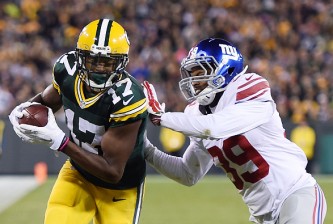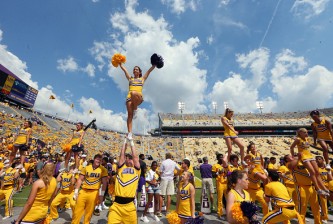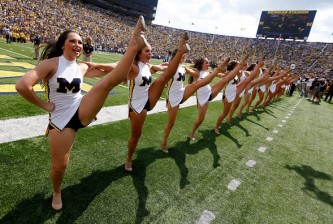One of the best sports business reporters bar none is Darren Rovell. He’s currently seen on CNBC’s myriad of programming including “Squawk Box“, “Power Lunch” and “Closing Bell“. In addition, Darren has conducted interviews with many of the world’s greatest athletes and sports power brokers. Darren also anchored and reported the acclaimed CNBC documentary, “Swoosh Inside Nike“. And Darren regularly blogs for CNBC to which I link to almost every day. Previously to joining CNBC, Darren worked at ESPN, reporting on sports business for ESPN.com and ESPNews. Darren’s entire bio is over at CNBC.
Over the last week, Darren and I exchanged e-mails and we discussed several subjects. Here is what transpired:
Fang’s Bites: You came back a month ago from China, covering the Olympics for CNBC. What are your impressions of the country and what did you take with you as you left?
Darren Rovell: I was there for the year out celebration and I couldn’t believe how much they had done in just one year’s time. The truth of the matter is that so much of a transformation could not have happened in any other city or country in the world. This Olympics, from a visual perspective, will never be topped. Ever. From the Bird’s Nest and the Water Cube being the most unbelievable stadiums/arenas we’ve ever seen to the Opening and Closing Ceremony, which was just unbelievable to watch. I come away with knowing that, although they spent $42 billion on the games, there’s a lot of things that will make Beijing better, which you don’t say for every city that hosts the Olympics. Other things will not change. It will still obviously be a communist regime, where the people just won’t have the rights that we have here in the United States.
FB: As we’re well aware, Michael Phelps came out as one of the more marketable stars of the Games. Besides your suggestion of him dating an A-lister, what else can he do to keep his name in the public eye over the next four years?
DR: Going to the VMAs (MTV Video Music Awards) and hosting Saturday Night Live is great, but we all know that those opportunities won’t be available in 2009 so it’s certainly going to be a challenge. Only a handful of Olympics stay relevant in a non-Olympic year. Besides dating an A-lister, which would keep him on the red carpet and in all the gossip mags, I’d say he has to forge marketing deals with companies that are going to use him. It’s worth taking less money to get a sponsor that he believes in, but promises to get his face out there plenty. Visa pays him a good deal, but they’ve done a good job of associating with him in the post-Games phase. It’s good for him too because his guarantees of appearances for them guarantee that he’ll get out there again. The good thing is that only blue chip sponsors can afford him so they’re going to want to spend just as much to activate the deal now. His price is too high to use him only in 2012.
FB: These Olympics turned out to be not so good for Nike, while great for Speedo. How do you account for how this happened?
DR: I’m actually going to disagree with you on that, Ken. I think Nike made a whole bunch of bets. Some of the American bets that they were pushing in track — especially Bernard Lagat and Tyson Gay — didn’t even qualify for the finals in their races and Liu Xiang, their biggest bet of the entire games, of course stepped on the track in the first heat and walked off. But I think Nike did well in the fact that I think their strategy of putting the Swoosh on the uniforms of the Chinese athletes while they were competing — instead paying the big bucks that Adidas paid to have the athletes wear their branded warmup on the victory stand — worked out better for Nike. Speedo had an incredible games in that they actually invented a piece of technology in the LZR Racer that the swimmers thought they had to wear in order to break world records. My big question is going to be, how much will that translate? Speedo insiders think they are going to sell at least 10,000 of those suits at $500 apiece. I’m not sure that’s possible. Also remember that Nike, believe it or not, got better exposure than Speedo on Michael Phelps. Because Nike sponsored Team USA, Phelps wore the Nike warmup on the victory stand and even in press conferences and Nike never paid Phelps a dime.
FB: One story you followed before you left was the sale of Brett Favre’s Jets jerseys. How well do you see Favre’s jersey selling this season?
DR: He will end up number one. He might even have an insurmountable lead at this point. And with the Bengals 0-2, I don’t think Mr. Ocho Cinco is catching up.
FB: Chad Ocho Cinco. Will we see that jersey on the field this season?
DR: As it stands now, I’m told he’d have to pay $700,000 and I don’t see him doing that. Short of him making some settlement, I don’t expect we’ll see that jersey on the field because it will set a bad precedent.
FB: In regards to the sale of the Chicago Cubs, who do you see winning the sweepstakes and how would a Mark Cuban ownership shake up MLB?
DR: I still think there’s a way to go and I don’t think they are getting sold this year. I’m betting early next year. I don’t think Cuban will shake up MLB as much as he’s done in the NBA. For some reason, I think there’s less to argue about from a marketing perspective.
FB: One event which always seems to amuse you is the annual Nathan’s Hot Dog Eating Contest. What is it about the event that fascinates you and do you see Major League Eating as a potential niche sport?
DR: I was originally fascinated by it because it was one of the most popular stories on ESPN.com. I then encouraged ESPN to broadcast it and it’s now turned into an animal. It’s a great television event for several reasons. First of all, it only comes once a year — on July 4th when people are hanging around a television anyway. Then you got a great presence at the event itself with one of the founders George Shea really hamming it up on stage. And the TV audience gets treated to his brother Rich Shea, who comes up with these lines like “He’s the Teemu Selanne of Salami” that keep you laughing the whole hour. What’s also amazing is that it never gets old. First you had the total domination of Kobayashi and then just when it was getting old and people were going to stop watching Joey Chestnut comes out of nowhere and beats him and then this year was the eat-off. Incredible. This event will always have a special place in my heart, um, I mean stomach.
DR: He’s cashing in big time in Japan. He reportedly pulls in hundreds of thousands of dollars.
FB: What is the strangest sports promotion you have seen in the years you’ve covered sports business?
DR: Well, there have been a lot of strange ones. I like strange and relevant. I loved when the minor league team the Brockton Rocks got the idea to sell the time to their opening pitch — to 7-Eleven. Every home game starts at 7:11 p.m. That was genius and was since copied by several major league teams.
FB: With the NFL now in season, what are some of the stories that you feel we’ll be reading over the next few months? Labor strife? Online streaming?
DR: I’ll take the NFL Network story into another season. It’s a fascinating tale. How the greatest sports league has had a tremendously hard time getting traction with their channel. They’ve tried plenty. They gave themselves those slate of games. They had two huge games last year and the carriers haven’t budged. There’s been word that they’re trying to forge an alliance, but you kind of wonder how committed the owners are to making this work and how much money they could really be making in its current state with its current carriage.
FB: Last year, Fox reportedly sought $2.7 million for a 30-second spot for a Super Bowl ad. Do you see advertisers getting a bang for their buck? And how much is too much? And what do you see NBC charging for Super Bowl XLII?
DR: Some advertisers get a bang for their buck, others don’t. What’s going to be interesting is to see how much Anheuser-Busch scales back on the Super Bowl game and on their priority to win the USA Today Ad Meter now that they are owned by InBev. I’m sure you’ve seen this, but so far NBC is reporting they’ve sold 85 percent of their ads at a market value of $3 million. That’s amazing. But the thing that separates the Super Bowl from any other sporting event is that, no matter who is playing, it’s always going to get a great rating. The other aspect that continues to drive the buck here is that it’s no secret that people pay more attention to the commercials during the Super Bowl than the commercials in any other single piece of programming throughout the year.
DR: It’s documented that Allianz was well connected with Nazi Germany. This hasn’t come up before in previous sports sponsorships with them, but if people wanted to make a deal of this, they certainly can and they did. I think the good thing that came out of it is to show that the people really can affect negotiation of sponsorships if they are really offended by it. I will say though that the revolt over Spiderman 2 logos on bases has still not been surpassed.
FB: How do you think the credit crunch will affect corporate sponsorship of sporting events and the purchase of luxury boxes by businesses?
DR: I think the credit crunch will affect the ability of people to buy teams. It will affect bank sponsorships and the decline of Bear (Stearns) and Lehman (Brothers) and the absorbing of Merrill Lynch by Bank of America could result in the New York teams — moving into three new stadiums over the next two years — actually reducing their original pricing for seats and PSL’s (personal seat liceneses) at some point. Our country is facing a tough time and sports is not recession proof.
FB: How has the sports business beat changed since you started reporting on it?
DR: It hasn’t really changed from the reporting standpoint. I think the appetite for it is much greater. When I started at ESPN, I think I had to convince everyone that there was a value to this reporting to the fan. I think now it’s pretty much accepted that fans feel like they need to know about the business in order to be the total fan and, if need be, win at the water cooler. And I think fans no expect to hear all the aspects of the business — from jersey sales rankings to endorsements to contracts.
FB: Ana Ivanovic, can she surpass Maria Sharapova in endorsements?
FB: Darren, thanks so much for doing the interview. Fascinating answers and great reading. I appreciate it.
DR: Thanks for the questions, Ken. Love the site. It’s part of my everyday reading.
Thanks again to Darren for taking the time out of busy schedule to answer my questions. Look for more interviews coming up in the next few weeks.






















